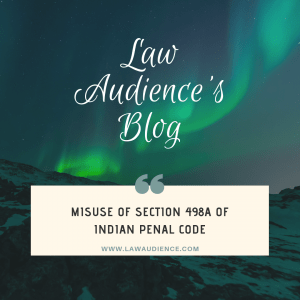AUTHORED BY: MR. PRANAV TOMAR, B.A.LL.B, 1ST YEAR STUDENT AT RAJIV GANDHI NATIONAL UNIVERSITY OF LAW & RESEARCH WRITER AT LAW AUDIENCE
I. INTRODUCTION:
This article basically deals with the provisions relating to bail under the Code of Criminal Procedure, 1973. There is no specific definition of Bail in the law but if we were to define it, Bail can be referred to as temporary release of the accused granted by the court or police from imprisonment with issuing his personal bonds with or without sureties in order to assure his presence during the rest of the trial. The provisions related to bail has been enshrined in Chapter XXXIII of the Code of Criminal Procedure, 1973. Section ranged from 436 to 450 deals with the provisions of the bail. The Law of Bail in the law constitutes itself to be a procedural law, and dynamic in nature in order to promote the principle of welfare state. The Law of Bail has two dovetail conflicting demand. Firstly, it has to shield the society from the hazards of being exposed to the accused who may or may not have committed the crime, and secondly maintain the fundamental cannon of the presumption of innocence until proven guilty beyond reasonable doubt.[1] When the person is on bail, he’s not quite a free man, but has to abide by certain restrictions imposed by the court.[2] There are two types of offences, namely Bailable and Non-Bailable for which the bail is given.
II. BAIL FOR BAILABLE & NON-BAILABLE OFFENCES:
Bail for Bailable offences is dealt under section 436 of the code. It states that the accused can be granted bail by the hands of police officer-in-charge by furnishing personal bonds with or without sureties. The accused is not required to approach the court for the furnishing of the bail[3]. It has been laid out in many cases that granting bail for the bailable offence is an inherent right of the accused which must not be violated by the authorities.
Refusal of bail must have a valid excuse otherwise it would be termed as illegal and the authorities will be liable for the offence of wrongful confinement under Section 342 of Indian Penal Code, 1860. It has been mentioned in the code, that if the accused person in unable to issue bonds within a week, then he must be released by the authorities by signing a personal bond by considering him an Indigent.
Whereas, the person accused of non-bailable offences can be released on bail by the virtue of Section 437 but after fulfilling certain parameters. For instance, the court may refuse the bail if the authorities have reasonable belief towards the accused being guilty of the offence or the offence committed is a cognizable offence and he has previously has been convicted for an offence whose punishment was either death penalty or life imprisonment not less than 7 years. In Court may direct to grant bail under non-bailable offences if the accused is below the age of sixteen years or is a woman or is sick or infirm.
III. ANTICIPATORY BAIL:
Section 438 of the Code enables a court to grant Anticipatory Bail, it suggests that, if a person has a reason to believe that he may be arrested for the accusation of the Non-bailable offence, he can approach the court for releasing him in bail. This type of bail is granted even before the person has been arrested[4].
The court after analysing certain factors such as the gravity of the offence, record of previous conviction, and possible circumstances indicating that he must not flee from justice can grant or refuse bail. Granting of Anticipatory Bail is also known for the discretionary power vested in the courts to be used in exceptional cases in order to protect the interest of the innocent[5].
IV. BONDS AND SURETIES:
Before a person is released on bail, it is mandatory for him to issue personal bonds with or without sureties. Barring the exception of accused being indigent. A Personal Bond can be defined as a Bond assuring the appearance of the accused in all future court dates[6].
The accused doesn’t have to post bail, but will forfeit the amount in the bond if the promise to appear is broken. A surety is an individual having an obligation by a contract to the court under which he agrees to pay the debt or perform a duty on the behalf of the accused person who is bound to pay or perform.
V. CANCELLATION OF BAIL:
Initially, there were no provisions regarding the cancellation of Bail but after the ruling of the Apex court, the changes were made in the Code.[7] As per section 437(5), the court may direct a person released on bail to commit to the custody which basically invokes the bail of the said accused. The high court has inherent power under section 439 to grant or invoke bail of the accused.
In the case Surendra Singh v. State of Bihar[8], Patna High court has stated certain grounds for cancelling a Bail:
- If the person found tampering with the evidence either during the process of investigation or trial.
- If the person commits the same kind of offence or commits any other kind of heinous offence during the process of bail.
- If a person accused absconded from the trial which delays the time of the justice.\
- If the person creates some other kind of problem in the society.
- If the life of the person on bail is in danger.
- If the court finds out that the accused person on bail has misused the privileges of bail.
- If the superior court finds that the lower court has granted the bail wrongly.
It has to be noted that bail can only be cancelled by the court which had granted it.
VI. CONCLUSION:
The Supreme Court has stated in many rulings that the prior objective behind granting bail to protect the innocent from unnecessary custody under the authorities. The bail is issued in order o secure the attendance of the accused in all the future dates of the court till the process of inquiry or trial has not to be completed. It can be a sound argument if someone says that the law of the land favors granting of bail as a rule to uphold the principle of natural justice.
[1] Govind Prasad v. State of West Bengal, 1998 CrLJ 1762 (Mad).
[2] Pulandar Singh Airajsingh v. State of Madhya Pradesh, 1979 MPLJ 273.
[3] Section 436 (1), The Code of Criminal Procedure, 1973 (India).
[4] Section 438 (1), The Code of Criminal Procedure, 1973 (India).
[5] Section 438 (2), The Code of Criminal Procedure, 1973 (India).
[6] Section 441 (1), The Code of Criminal Procedure, 1973 (India).
[7] Talab Haji Hussain v. Madhukar Purshottam Mondkarand 1958 AIR 376 (India).
[8] Surendra Singh v. State of Bihar 1995 (2) BLJR 1132 (India).



